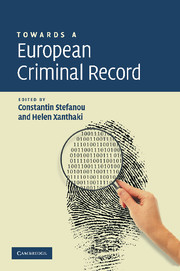Preface and acknowledgements
Published online by Cambridge University Press: 13 July 2009
Summary
EU criminal law is often misunderstood as an avant garde area of legal integration that lacks legal basis, consistency and legitimacy. This is not necessarily untrue. But any criticisms of that nature should be laid before the EU and national actors who have devised the relevant instruments in the manner observed so far. There is nothing ‘strange’, inconsistent or illegitimate about EU criminal law as a field of legal integration.
Consequently, research and analysis of aspects of EU criminal law is often presented as a risky business. This is true but again it must be attributed to the scattered, unimaginative and often borderline legitimacy of EU instruments. In an area where unanimity in decision making is often seen as a sanctification of any political and legal position that manages to reach consensus, commentators struggle with requirements of adherence to competence and data protection issues. The European Criminal Record is a paradigm of this state of affairs.
The Reform Treaty may contribute to the unlocking of this vicious circle. The abolition, finally, of the third pillar may, and in a way inevitably will, bring with it increased subsidiarity and proportionality tests and increased controls of competence and legitimacy issues. This is a very fluid, yet incredibly exciting time, for those promoting the EU ideal on a solid basis even in the field of EU criminal law.
This is a time when competencies in the field of criminal law will have to be revisited and defined clearly and concretely.
- Type
- Chapter
- Information
- Towards a European Criminal Record , pp. ix - xPublisher: Cambridge University PressPrint publication year: 2008



